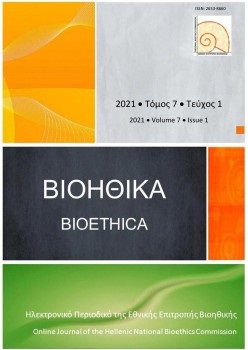Βιοηθική και δημόσια υγεία: από τη δεκαετία 1970 στην πανδημία COVID-19
Abstract
Η δυνατή στην προβληματοθεσία της σχέση βιοηθικής και δημόσιας υγείας τίθεται ήδη από τις αρχές της δεκαετίας 1970. Η επιδημία HIV/AIDS, η οποία ενσκήπτει τη δεκαετία 1980, δρα καταλυτικά για τη διεύρυνση των επεξεργασιών πλαισίων ηθικής στη βιοηθική με τη συμπερίληψη της πράξης στη δημόσια υγεία ενώ στις αρχές του 21ου αιώνα η ηθική στη δημόσια υγεία αναδύεται ως επιστημονικός κλάδος και καθιερώνεται ως υποπεδίο στη βιοηθική.
Θεματικές ενότητες στη ηθική στη δημόσια υγεία συγκροτούν περιοχές όπως η ηθική της έρευνας, η ηθική και ο έλεγχος λοιμωδών νοσημάτων, η ηθική της προαγωγής της υγείας και της αποτροπής της νόσου, τα ηθικά ζητήματα στην περιβαλλοντική και την επαγγελματική υγεία, η δημόσια υγεία και ο μετασχηματισμός των συστημάτων υγείας: πρόσβαση, καθορισμός προτεραιοτήτων και κατανομή πόρων, η διεθνής συνεργασία για παγκόσμια δημόσια υγεία, η ευαλωτότητα και οι περιθωριοποιημένοι πληθυσμοί, η γενετική στη δημόσια υγεία, η γονιδιωματική στη δημόσια υγεία. Η πανδημία COVID-19 φαίνεται να αποτελεί περιοχή εννοιολογικής και πρακτικής αλληλεπικάλυψης των ανωτέρω θεματικών ενοτήτων και να δίνει τεράστια ώθηση στο ερευνητικό ενδιαφέρον για τη βιοηθική στη δημόσια υγεία.
Το παρόν κείμενο εξηγεί σε δυο περιόδους τη σχέση βιοηθικής και δημόσιας υγείας, ήτοι την πρώτη, «πρώιμη» εποχή, των δεκαετιών 1970, 1980 και 1990 και τη δεύτερη των δεκαετιών 2000 και 2010, εποχή ανάδυσης και καθιέρωσης της ηθικής στη δημόσια υγεία, σηματοδοτούμενη στο τέλος της από την πανδημία COVID-19.
Article Details
- Zitationsvorschlag
-
Aspradaki, A. A. (2021). Βιοηθική και δημόσια υγεία: από τη δεκαετία 1970 στην πανδημία COVID-19. Bioethica, 7(1), 6–19. https://doi.org/10.12681/bioeth.26532
- Ausgabe
- Bd. 7 Nr. 1 (2021): Bioethica
- Rubrik
- Original Articles

Dieses Werk steht unter der Lizenz Creative Commons Namensnennung 4.0 International.
Authors who publish with this journal agree to the following terms:
- Authors retain copyright and grant the journal right of first publication with the work simultaneously licensed under a Creative Commons Attribution CC BY 4.0 License, which allows for immediate free access to the work and permits any user to read, download, copy, distribute, print, search, or link to the full texts of articles, crawl them for indexing, pass them as data to software, or use them for any other lawful purpose. Appropriate credit must be given by citing the author(s) and the original publication in this journal.
- Authors are able to enter into separate, additional contractual arrangements for the non-exclusive distribution of the journal's published version of the work (e.g. post it to an institutional repository or publish it in a book), with an acknowledgement of its initial publication in this journal.
We encourage authors to deposit their articles, as well as data underlying the publications, in institutional and/or other appropriate subject repositories.
Bioethica permits and encourages authors to archive the final publication pdf in institutional (e.g. the repository of the National Hellenic Research Foundation) or other appropriate subject repositories (e.g. SSOAR repository for social sciences), in compliance with institutional and/or funder open access policies, after publication in the BIOETHICA. Authors must provide bibliographic details that credit publication in the journal, as well as related funding details (when applicable).
Lists of institutional and other subject-based academic open access repositories can be found listed by country at the registry http://opendoar.org/countrylist.php
If your institution does not possess a repository you may deposit a copy of your paper at no cost with www.zenodo.org , the repository supported for open access research in the EU by the European Commission, through the project OpenAIRE (www.openaire.eu )



